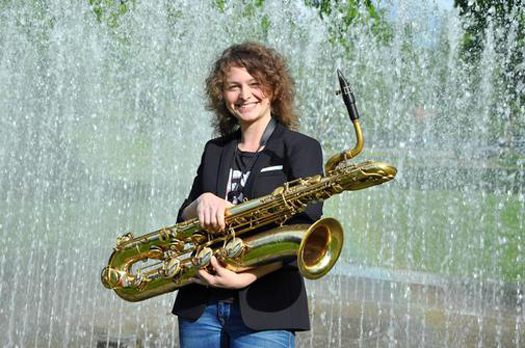Jazz interview with jazz Baritone saxophonist Tini Thomsen. An interview by email in writing.
JazzBluesNews.com: – First let’s start with where you grew up, and what got you interested in music?
Tini Thomsen: – I grew up in the north of Germany on the outskirts of Hamburg and the gentle force of my parents got me into music. Piano playing was part of the upbringing as my fathers female ancestors are all musicians, back to 5 generations. But my parents didn ́t tell me that there were more styles than just classical music. I discovered jazz and pop very late but the impact was even heavier… and in the end it was Tony Curtis from ‘Some like it hot’ who made me wanna play the saxophone.
JBN: – How did your sound evolve over time? What did you do to find and develop your sound?
TT: – My sound is maybe the most stable occurrence in my life so far. Of course it gets fine-tuned over the years but my general concept didn’t change much after I had played for 5 years. Only very recently I changed my mouthpiece and the saxophone, which both where the very same I was playing since I was 18. (that is 20 years back from now if you must know…) Back then I was playing in a saxophone ensemble where I was the rhythm section of the band and had to develop a sound that can cut through, which I think to reach best with a sharp edged sound, lot of attack and a sustained note. Think high hat and bass in one instrument. Most saxophonists come from being the melody instrument, I come from thinking bass lines and trying to add the melody aspect into it.
JBN: – What practice routine or exercise have you developed to maintain and improve your current musical ability especially pertaining to rhythm?
TT: – Dancing. There are still musicians who ́s dancing has no relation to the pulse of the music, which is a true miracle to me. Not a good one by the way. Also when I ́m biking or walking in a steady rhythm, or even driving in the car that produces a pulse of some sort (the indicator f.e.) I automatically start singing to it. Also I used to play drums in some bands. I really hope there is no video ever taken of it but it did train my ability to feel rhythm.
JBN: – Which harmonies and harmonic patterns do you prefer now? You’re playing is very sensitive, deft, it’s smooth, and I’d say you drift more toward harmony than dissonance. There is some dissonance there, but you use it judiciously. Is that a conscious decision or again, is it just an output of what goes in?
TT: – Good and slightly confronting question… I ́d love to have more musical vocabulary and play more with dissonance/harmony but as I always played the baritone sax, those interesting stuff was difficult for my hearing to place it. Upper structures are not called that for no reason- when an alto sax is playing a mid range dissonant note it sounds super interesting. When a bari sax is playing in his mid register it just sounds wrong to my ear because of the little distance to the bass notes. But I recently discovered that if I play just faster it doesn ́t sound so weird. So be prepared for some fast crazy stuff in the future…
JBN: – How to prevent disparate influences from colouring what you’re doing?
TT: – Not! I love disparate influences and get more of it than of anything else. It ́s the creation itself that inspires me, not the package that it comes in.
JBN: – What’s the balance in music between intellect and soul?
TT: – Of course it ́s a very individual answer you ́ll get here. Also I know musicians who put the soul into the music through their intellect. For me it ́s easy: when I compose I tap into the soul of music and receive a package of information. My intellect is translating it into what I see on paper and what is called the composition. And when it comes to performing the music, it ́s the soul ́s turn again to speak, but only with the help of my skills as a musician. I could go on forever with these examples but I think you get the point.
JBN: – There’s a two-way relationship between audience and artist; you’re okay with giving the people what they want?
TT: – How do I know if I give them what they want? I give what I can give and miraculously there are some people who like it. It ́s a great feeling when my music can do good to people but as I said earlier, I prefer to play my music to 50 people that really like it than to 5000 people for whom I had to twist myself. Let me put it like that: I ́m ok with giving people my authenticity and I ́m happy to receive recognition for that in what form soever. Though your question makes me think. If anyone reads this who has an opinion on what else I should be doing with my music, please contact me, glad to have input!
JBN: – Please any memories from gigs, jams, open acts and studio sessions which you’d like to share with us?
TT: – One of my most fun gigs in the last year was impersonating the Cock from the german fairytale ‘Die Bremer Stadtmusikanten’ (City musicians of Bremen). I was running through the audience playing soprano sax and was wearing a rubber chicken on my head. Which reminds me of another gig in Berlin, a badly payed big band gig. During the 3 days we stayed in town I got a speeding ticket, two parking tickets, got caught in the tram without a ticket, and a fine for driving an old diesel car in town.
JBN: – How can we get young people interested in jazz when most of the standard tunes are half a century old?
TT: – What would happen if millions of young people would be interested in jazz? The music industry would eat up the free spirit that can still exist in some hidden corners of jazz. For example imagine me being featured on tv because I have so many followers that the mass media invites me. That’s a special skill that should be left to those who are made for it and trained for it. I would totally go off script, try to sell organic vegetables on tv, poke my nose etc but not in a cool, hip or adorable way. I ́m fine with it but I think it would raise some eyebrows of those who are not ready for that much authentic behaviour and I think the majority still likes to see a kind of perfection on tv as an idol. If a young person feels the need for more, he or she will find more and maybe even the jazz. In that case it really doesn’t matter how old the standard tunes are, as Jazz is an expression for the here and now and one should listen to it with that thought in mind.
JBN: – John Coltrane said that music was his spirit. How do you understand the spirit and the meaning of life?
TT: – Wow, you ́re not holding back with the deep questions..! The spirit for me is the act of creation. If this is done tuned into the divine source, it gives the spirit a way to express itself. To make those moments possible is the purpose for my musical life.
JBN: – If you could change one thing in the musical world and it would become a reality, what would that be?
TT: – I would love to separate money from music. Or more specifically, the act of creating music from being judged by sales. How a musician, or rather a composer gets payed in that world.. no idea. No wait, I have the answer. We need a device that can measure peoples thoughts and the more positive the audiences thoughts are during a concert the less rent the composer has to pay… maybe?
JBN: – Who do you find yourself listening to these days?
TT: – Honestly I haven ́t got the time to sit down and listen to music actively. For me it doesn’t work to just play some nice music in the background and do something else meanwhile. So I find myself listening to whatever I ́m working on. At this moment I ́m doing arrangements for a group of African musician and I enjoy listening to that. For the same concert I have to make a jazz version of a classical trombone concerto.. so I’m still being fed enough music.
JBN: – What is the message you choose to bring through your music?
TT: – Love and Happiness.
JBN: – Let’s take a trip with a time machine, so where and why would you really wanna go?
TT: – Some 100 years ago to the area of Schlesien to see my great grand mother being an opera singer. And then some 1000 years earlier back in time anywhere in Europe to see the sky at night without air pollution. And then to the future, like 50 years from now, to check out how music is developing, then back into the here and now and get the most out of that knowledge.
JBN: – I have been asking you so far, now may I have a question from yourself…
TT: – I like the last question you asked me. So I give that one back to you. The one with the time machine.
JBN: – Thanks for answers. It was good if I returned to the 50s of the last century, and I was bi in the concerts of John Coltrane, Miles Davis, Ella Fitzgerald and others.
JBN: – So putting that all together, how are you able to harness that now?
TT: – By intuition and by the help of people who see my failures coming before I do.
Interview by Simon Sargsyan







More Stories
Interview with Janis Siegel of The Manhattan Transfer: Jazz, being a more refined, interpreted form of music
CD review: George Benson – Dreams Do Come True: When George Benson Meets Robert Farnon – 2024: Video, CD cover
The band was tight as ever. The Warren Haynes Band cuts loose: Video, Photos